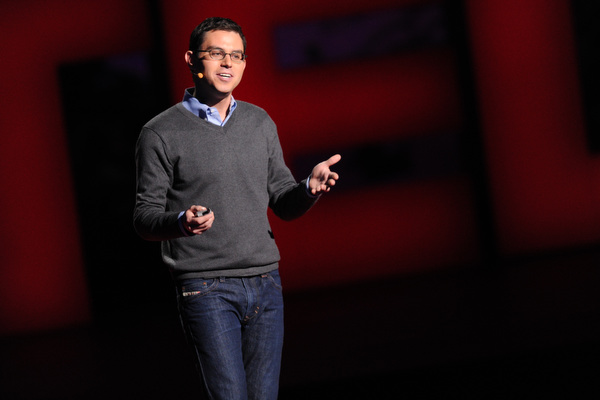Photo: James Duncan Davidson
Joshua Foer challenges the audience to close their eyes, and then he tells a very strange story. In summary:
“Imagine yourself standing outside the front door of your home. Notice the color of the door, the material it’s made out of. Now visualize a pack of overweight nudists on bicycles. They are competing in a bicycle race and heading straight for your front door. They’re sweaty. They’re bouncing around. They crash straight into the front door of your home. Spokes end up in awkward places. Step over them into the foyer and appreciate the quality of the light. It’s shining down on Cookie Monster. Cookie Monster is waving at you from atop a tan horse. You can smell the oat and raisin cookie he’s about to shovel into his mouth. Head to your living room, and picture Britney Spears, scantily clad, dancing on your coffee table, singing Hit Me Baby One More Time. Now follow me into the kitchen, which has been paved over with a yellow brick road and where coming towards you are Dorothy, Tin Man et al.”
It’s okay. Foer hasn’t lost his mind. Instead, he is telling us the story of his journey into the hinterland of competitive memorizing, which is not, in fact the “Superbowl of savants” but a “bunch of guys and a few girls of widely varying ages and hygienic upkeep memorizing hundreds of random numbers by looking at them just once.” As a science journalist, Foer had covered a New York competition and he got to talking to some of the competitors. Who were not, it turned out, insane eggheads, but who had instead trained their memories to memorize strange things. And Foer challenged one of them, a Brit called Ed Cook, to see if he couldn’t train him to do the same. Cook, had wanted to teach Britney Spears (the thinking being if she could memorize the order of a pack of cards, it would prove that anyone could do it), but in her absence, he agreed to teach Foer. “It was,” says Foer, “the beginning of a very strange journey.”
The obvious question: how do these guys do these extraordinary feats? Feats such as the one mastered by Ben Pridmore, from England, who taught himself a technique to memorize the order of 36 packs of shuffled playing cards in one hour. The secret apparently lies in “elaborative encoding.” Hence the story Foer tells us upfront. We have exceptional visual and spatial memories, which we can call a “memory palace.” And if we populate our palace with crazy things related to ideas we want to remember, the more unforgettable these ideas are likely to be.
“So you want to do a TED speech from memory, the way Cicero would have done it if invited to TEDxRome?” asks Foer. “Picture yourself at the front door of your house, come up with some crazy, ridiculous image to remind you that the first thing you want to talk about is this contest. Go in your house; Cookie Monster on top of Mr. Ed reminds you you want to introduce Ed Cook. Britney Spears is there to remind you of the funny anecdote. Then in the kitchen, the fourth topic is about the strange journey you went on for a year.”
This, says Foer, is precisely how Roman orators memorized their speeches. “Word for word will screw you up. It’s topic for topic.” Foer became obsessed with memory contests, and then it dawned on him that he needed to enter one in order to be able to write about it effectively. After all, watching a memory contest is like watching “a bunch of people sitting around taking their SATs.” Not exactly gripping magazine article material. Something else: Foer found it was actually shockingly fun. But then, the experiment went haywire: he won the contest! “That really wasn’t supposed to happen.”
For all the fun, Foer ends his talk with a warning. Memorizing things is actually beside the point. It’s more important for us to live a life remembered. “How much are we willing to lose from our already short lives by losing ourselves in our BlackBerries and our iPhones?” he asks before concluding: “To live a memorable life, you have to be the kind of person who remembers to remember.”

Comments (6)
Pingback: A good memory is inherent in all of us | Backwards Induction
Pingback: Feats of Memory anyone can do | Free psychology
Pingback: Josh Foer: Your memory, outsourced | Tim Batchelder.com
Pingback: – remember to remember
Pingback: Remember This « Language & Composition
Pingback: Your memory is what you make of it « TEDxBrussels Blog